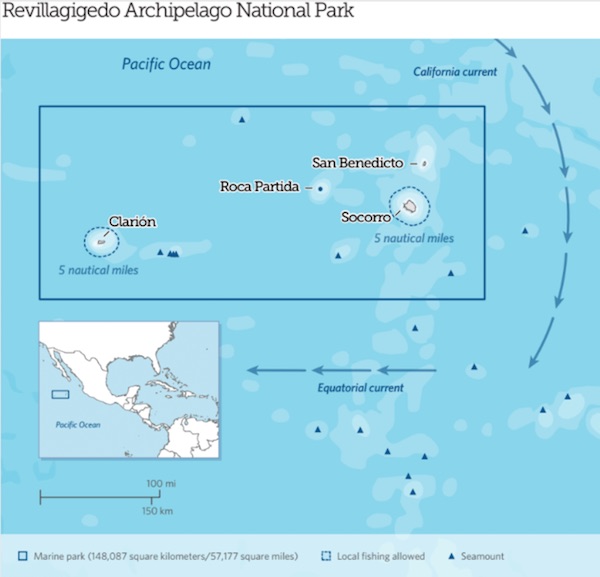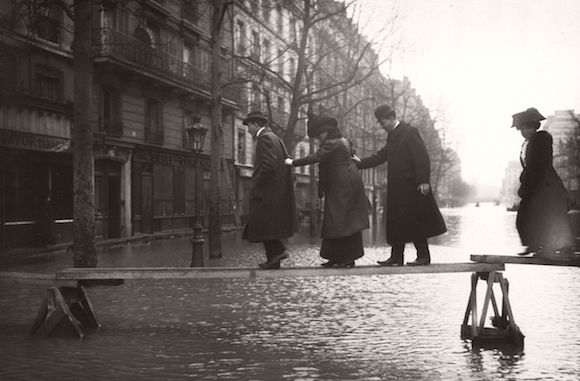
Gallica Great Paris Flood 1910

Very interesting transcript of a MacroVoices talk with fund manager Francesco Filia. It doesn’t really fit into the Debt Rattle format, so go to Zero Hedge to read it all.
• The World’s Twin Asset Bubbles Could Collapse Under Their Own Weight (Filia)
I think the equity bubble is quite uncontroversial, is quite unambiguous. There are a lot of different valuation metrics for those that care to look into them. They’ve been valid for over a hundred years of modern financial markets. And this time is no different in that respect. There are the usual metrics that the valuation guys are looking at, like financial assets to disposable income that shows that this market is way more expensive than at any point in history including the big dot com bubble and the Lehman moment in 2007-2008. But there are other metrics like the Buffett Indicator (market cap on GDP), the median debt on total assets, the corporate debt to GDP, the price on sales, the price to book, enterprise value on sales, enterprise value on EBITDA – there are a number of different metrics. They all convene that this is a market bubble that has not been seen before in history.
But we at Fasanara, we developed our own indicator just to try to add something to what was available already. And we started with one of the most famous of all the indicators in this respect, which is the Shiller adjusted PE ratio, or the CAPE ratio. This is the most famous of them. Professor Shiller got a Nobel Prize in 2013 for it. And for his studies on market inefficiencies and for the ability to infer future expected returns from valuation metrics such as the Shiller PE. And, based on the Shiller PE, what it does is simply to compare current prices to not spot earnings of foreign earnings, but a more reliable measure of the average of the last ten years and adjusted for inflation. So the average of the last ten years of real earnings. And on the basis of this index, we find out that the market is as expensive and just a little bit less expensive than it was in 1929 during the Great Depression, the peak of the market before the biggest collapse in equity prices ever seen, and the year 2000. So just slightly cheaper than the year 2000.
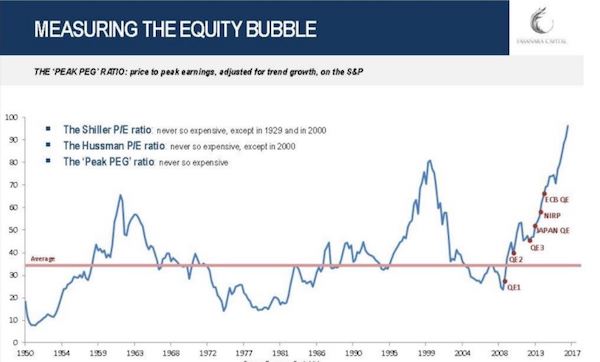
What we do is an evolution of the Hussman PE ratio (which is taken from the Shiller ratio) which is to compare – kind of putting all in the basket. So we put the peak earnings as opposed to average earnings, and for peak earnings we really mean the peak. We take the two top quarters over the last 40 quarters. So we cannot really be seen as being any more generous to the current markets, we take the two peak quarters of the last 40 quarters. And then what we do is we compare these peak earnings to potential growth, or trend growth. Because the point here is that what you pay in terms of stocks, should compare, not just to the past or the earnings of proposition, but also to the overall economy generally. Because if the overall economy has a lower potential growth you should be expecting to be able to pay less in terms of multiples than otherwise. The overall economy has a big correlation to earnings and to profit margins, so you should expect the potential growth rate of the economy to be quite relevant when it comes to PE multiples.
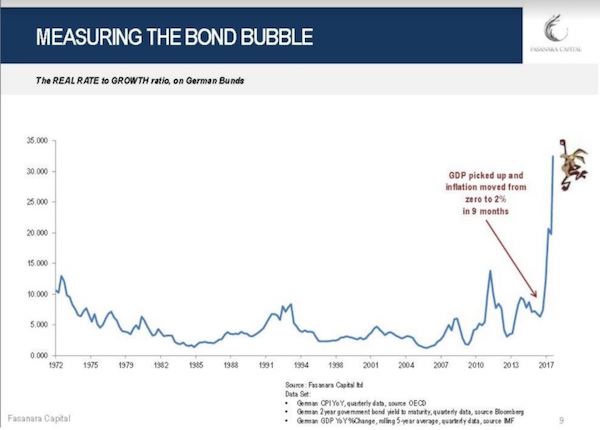
There can be a catalyst. Or there can be no catalyst. If you talk about catalysts, I could argue that can be inflation, for example. At the moment, we have seen that inflation resurfaced. We have seen some tightness in the job market. It has not translated yet into wages growth and therefore inflation. But we could just be about to see that. And, in that case, rates would rise and they would provoke as a catalyst the kind of downfall that we expect. Or the catalyst could be political. A lot of quantitative easing is being created and it is benefiting only the top 1% of the population. And it is resulting in this so-called income inequality concept.

“Crap in, crap out? That’s how we make policy?”
• Atlas Stumbles – Inequality And Macroeconomics At A Crossroads (DDMB)
Here’s a news flash: “We don’t want a boom-bust situation.” If you’ll pardon the cynicism, Janet Yellen has chosen now, the twilight of her time at the Fed to discover the words and wisdom of Ludwig Von Mises, father of the Austrian economic school of thought, detractor of the perils of malinvestment? Now?? More to the point, it’s a real trick to not want something we’ve had for over 30 years. As for being flummoxed on stubbornly low inflation, as Yellen contends, that in 2017 inflation is “more of a mystery” than ever, allow an outtake from Fed Up to shed some light. For the record, Janet Yellen was in attendance at the 2014 Federal Open Market Committee (FOMC) meeting at which the following scene took place.
“Anything but bashful at his first FOMC meeting, Governor (Stanley) Fischer asked why the Fed relied on the core personal consumption expenditure (PCE) measure of inflation. Fischer said he lived his life by the Consumer Price Index (CPI), as did his children. In his opinion, the only realistic measures of inflation were the CPI and the Dallas Fed Trimmed Mean PCE. (I bet Fisher got a kick out of that, since this relatively young metric had been nurtured under his leadership.) One brave Fed staffer explained that the models the Fed used to set interest rates wouldn’t function if they didn’t use PCE. The no-nonsense Bullard jumped in. “Let me get this straight,” Bullard said, according to a Fed official who was present. “Crap in, crap out? That’s how we make policy?” It’s the model. It’s broken and it has been for years. Stop using it. Mystery solved. Next?
On this Fed Meeting Minutes Wednesday, now that we can safely speak of the end of the Yellen (Greenspan, Bernanke) mega-era, could we please petition Jay Powell and the new regime to stop doctoring the minutes from FOMC meetings in an effort to herald honest and true ‘transparency’ in future Fed communique? After all, it was Yellen herself who brazenly called for manipulating the minutes, in recorded Fed transcripts, no less. She had this to say at the December 2008 meeting at which policymakers voted to take the fed funds rate to the zero bound: “We could also consider using the FOMC minutes to provide quantitative information on our expectations.” Could ‘we’ not instead?
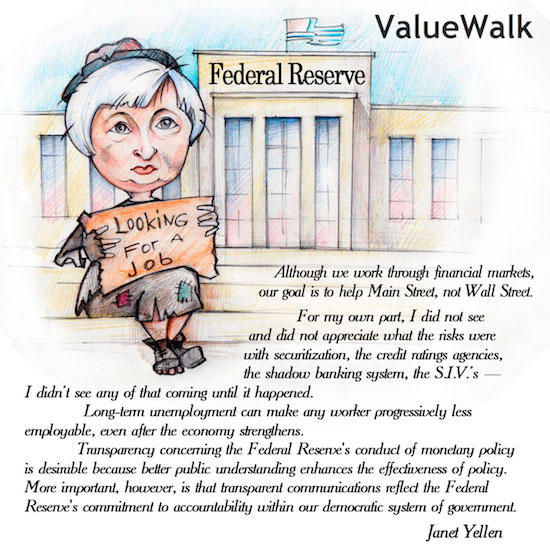

What you call a leading title. Of course they know. Cashless doesn’t work in Germany at all. Think that’s just some weird coincidence?
• Europeans Still Love Paying Cash, Even if They Don’t Know It (BBG)
Digital currencies may be getting all the buzz these days, but notes and coins still reign supreme in most of Europe. Cash made up around 79% of everyday payments across the euro area last year, according to a ECB study. Almost a quarter of consumers also kept some cash at home as a precaution, and 20% said they had a high-denomination note – €200 ($237) or €500 – in their possession in the year before the survey was conducted. As the study notes, the results “challenge the perception that cash is rapidly being replaced by cashless means of payment.” The picture differs across the 19 member states though. Cash is most dominant in southern Europe, Germany, Austria and Slovenia, where it in accounts for 80% of all payment transactions at point-of-sale.
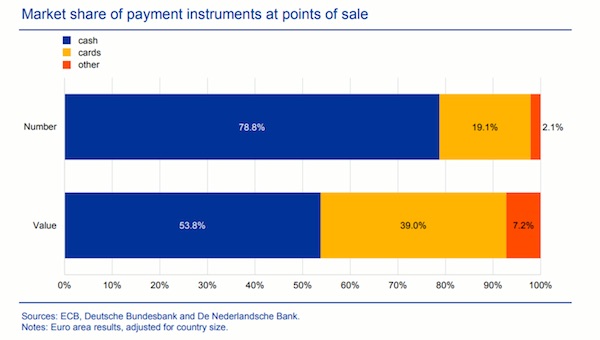
That figures drops to 45-54% in the Netherlands, Estonia and Finland. The study also found that many people don’t actually know their own payment habits. When asked how they prefer to pay, a larger share of respondents said card, not cash. That may be because nearly two-thirds of all transactions are below €15, the report said. Purchases of coffee and lottery tickets don’t stick in the mind as much as, say, a new pair of shoes. The experience of some countries shows how things can change though. While contactless cards accounted for just 1% of payments across the euro area in 2016, the figure was almost 10% for the tech-savvy Netherlands. The authors of the study say that the small size of contactless payments – 81% of transactions are below €25 – give the technology great potential.
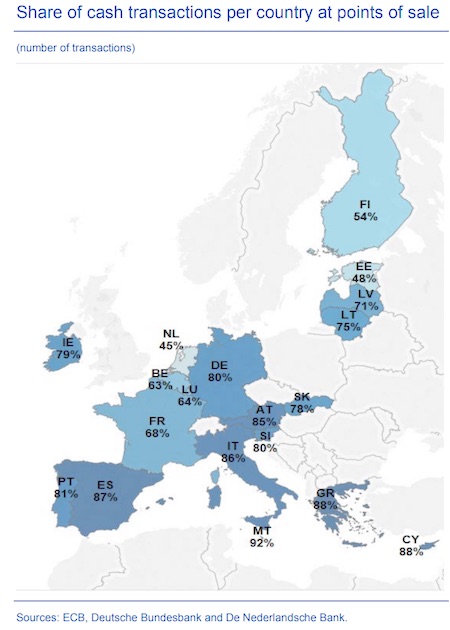

Power blocks fall apart all over. Germany better be careful. Merkel’s wounded, and she’s all they’ve known for 12 years.
• Echoes of Weimar Republic as Germans Lose Knack Of Coalition-Building (G.)
For years, German politics were both mocked and admired for being too uneventful to the point of tedium. Only recently the lack of drama inside the reconstructed Reichstag’s circular plenary chamber led to calls for a more confrontational, Westminster-style approach. But as old geopolitical certainties have crumbled over the past 18 months, Berlin’s consensual, unexcitable style of policymaking has won new admirers. The collapse of talks to form the next coalition government have exposed Angela Merkel’s diminished authority. Many are now beginning to wonder if the division wrought on Britain and the US by Brexit and Donald Trump has also descended on Europe’s biggest economy.
With Merkel’s last coalition partners, the Social Democratic party (SPD) and the Free Democrats (FDP), more eager on parliamentary opposition than on government posts, and an already ultra-oppositional Alternative für Deutschland hoping to receive a further boost from the political standstill, commentators in Germany have started to evoke the darkest days of the Weimar Republic, when short-lived minority governments ruled by emergency decrees. “Like in Weimar, the federal republic is now a multiparty system in which extreme parties have begun to paralyse the working of the parliamentary democracy,” wrote Stephen Szabo, an expert on US-German relations.
“Germany’s obsession with stability was largely a result of reforms aimed at avoiding the mistakes of the Weimar Republic,” said Anthony Glees, a historian at the University of Buckingham. “In spite of a proportional vote system, a 5% threshold for smaller parties guaranteed that postwar Germany was for decades a two-party state, where the power would lie safely in the centre.” With polls for possible fresh elections next year predicting that both Merkel’s Christian Democratic Union and the SDP could drop below 30% while support for the FDP, the AfD, the Greens and the Left party continues to grow, Glees said, “that system is now biting Germany in the leg”.

A bitter divorce lurks.
• EU Demands In Next Round Of Talks Set To Enrage Cabinet Brexiteers (Ind.)
EU negotiators are already laying the groundwork to hit the UK with demands in the next stage of Brexit talks that are unacceptable to key figures in Theresa May’s Cabinet, The Independent can reveal. Leaked documents show chief EU negotiator Michel Barnier wants to make giving the UK a good transition deal conditional on Britain’s “automatic” acceptance of new Brussels regulations during the likely two-year period after March 2019. The plan, set out to EU leaders behind closed doors, would leave the UK with no say over rules it accepts during the transition and is likely to enrage Brexiteers in the Cabinet like Boris Johnson, Michael Gove and Liam Fox, who are determined 2019 should be the last year Britain takes new rules from Brussels.
[..] The papers consist of a presentation, drawn up by Mr Barnier for the EU27’s representatives, in which he says any UK transition out of the EU must involve the “automatic application in the UK of new EU rules post-30 March 2019”. The chief negotiator is clear Britain would have “no institutional rights, no presence in the institutions” and “no voting rights” under his plan, meaning the UK would end up following rules made in the interests of the remaining member states and even incorporating them into British law with no control of how they are formed. Any potential conflict over the transition has yet to surface because the EU has said it will not discuss future arrangements on that or trade until the three withdrawal issues have made “sufficient progress”. But the leak shows the direction the bloc is taking behind the scenes and indicates probable obstacles to agreement in future rounds of talks.

Will Rajoy ban the independence parties altogether?
• Catalan Leader Doubles Down on Independence Pledge (BBG)
Ousted Catalan President Carles Puigdemont pitched his candidacy ahead of next month’s regional election, doubling down on his pledge to make the region an independent state. Puigdemont, who maintains he’s the legitimate regional president after being sacked by the central government, will lead a new platform under the banner of Together for Catalonia. He said on Saturday a victory at the polls on Dec. 21 would serve to ratify his mandate and send a signal to the European Union, which has repeatedly sided with the government of Mariano Rajoy against unilateral attempts for independence. “The people of Catalonia have shown the world we have the capacity and the will to become an independent state,” Puigdemont told an audience in Bruges, Belgium, where he’s been staying since declaring independence last month.
“On Dec. 21, we must ratify that.” The independence movement is trying to reshape its message after the Rajoy administration invoked unprecedented constitutional powers to oust the regional government and take direct control of the wealthy region. The Madrid government acted after the ill-fated independence declaration that led thousands of local companies move their registered address. Puigdemont remains in Belgium awaiting a court decision to execute a European arrest order from a Spanish judge on charges of rebellion that could see him jailed for as long as 30 years. He blamed authorities in Madrid for limiting his ability to campaign. Rajoy’s administration has accused him of fleeing the nation to escape legal responsibilities.
Catalonia Deputy President Oriol Junqueras and half the ousted regional cabinet remain in prison, pending trial on the same charges unless a judge opts to release them. The question remains whether they’ll be able to campaign if the Supreme Court, which is handling the case, finds sufficient grounds to order their release while the investigation continues.

“..we have reached peak denial in our civilization and whether we like it or not reality is about to make a come back.”
• The End of the Age of Benevolence (Marion)
Some evenings I sit on the sofa in the family room with my teenage daughter and watch a TV program with her. I leave the choice of the show to her, it matters little to me, and when she finds something she likes she sits next to me, puts her head on my shoulder, and snuggles up for the hour it takes to watch whatever it is she’s chosen. It’s our time. Occasionally we’ll sneak in another twenty or thirty minutes to the objection of her mother but I like my time with her so I put up with the raised eyebrows and the, “She’s got school tomorrow,” scoldings. It’s important to me that she knows I love her, that I want to spend time with her and that she feels safe when she is with me. Someday, when she is a grown woman I want her to find a man that will take care of her and protect her like I do. I expect no less from a suitor and neither should she.
There will be women who read this who will object to my stance. They will say, “She doesn’t need a man to feel safe or validated or content,” but I would disagree. When she gets older she’ll need a good man, not just any man, and that’s as true today as much as it was ten years, twenty years, fifty years, one hundred years and even one thousand years ago. And it will become even more so as time goes on. Indeed, we have reached peak denial in our civilization and whether we like it or not reality is about to make a come back. The freedom that we have enjoyed in the west and the modern democracies that have sprung forth from our evolving and enlightened philosophies over the past few hundred years are not a given. Granted, they are preferable outcomes given our natural state but politically speaking they are an anomaly in the history of mankind and not the norm.
As such, democracy and the systems, social structures and institutions that have grown up around them are grossly misunderstood by the vast majority of the western world. Most of the people living in the west today have been raised to believe that democracy is a moral system of governance and that it is our gift to the rest of mankind. But democracy is not an inherently moral system nor is it a guarantor of linear, progressive political growth. At its root democracy is quite simple. It is the exercise of political power by the majority over the minority. It is the power to choose in matters of politics. This, of course, begs the question: to choose what? Since choices in general (and political ones are no exception) can be either good or bad, in this case, both for the individual and the body politic, then it follows that democracy is neither.
It is nothing more than a tool for decision making where the majority holds the power to make decisions that affect everyone, either for better or for worse. Democracy is, therefore, a reflection of the character of the people who exercise it. Additionally, democracy is also the use of soft force. That is, the minority bends to the will of the majority on political matters and the apparatus of the state is responsible for carrying out its demands. The minority consents, willingly or unwillingly not because violence is present but because, by the state’s presence, it is implied. More importantly, though, democracy is a luxury that is preceded by benevolence but does not necessarily guarantee its continuance or creation if forgotten.

Tragedy. Entirely unnecessary.
• Greeks Cutting Down On Food Due To Overtaxation (K.)
Overtaxation has forced Greeks to cut down on grocery spending, as IRI Hellas researchers have found that supermarket sales in the January-September 2017 period were 6.7% below the level recorded two years earlier and 7.4% below the 2014 level. Consumers have become bargain hunters out of necessity, not only because of the proliferation of special offers at supermarket but also due to the hikes in value-added tax and the special consumption taxes on most everyday products, on top of the direct tax obligations that households have to meet.

Even more tragic. And just as avoidable.
• Libya Navy Says Over 30 Migrants Dead, 200 Rescued Off Coast (AFP)
More than 30 migrants died and 200 were rescued on Saturday after their boats foundered off Libya’s western coast, the Libyan navy said. The coastguard conducted two rescue operations off the city of Garabulli, 60 kilometres (40 miles) east of Tripoli, spokesman Colonel Abu Ajila Abdelbarri said. He added that patrols had found 31 bodies and 60 survivors from one boat, while all 140 passengers had survived in a second boat. “When we arrived at the spot, we found an inflatable dinghy with several people clinging to part of it,” he said. Libyan navy spokesman Ayoub Qassem told AFP that 18 women and three children were among the dead recovered from the sea, while 40 people were missing.
Migrants from Somalia, Ghana, Ethiopia, Nigeria and four from Pakistan were among those rescued. Libyan patrol boat commander Nasser al-Ghammoudi said one of the vessels was three-quarters under water when the coastguard arrived. “We looked for other survivors for more than five hours,” he said. “We were able to rescue one woman after we heard her shouts.” A French NGO, SOS Mediterranee, said later Saturday that it had rescued more than 400 people from a stricken wooden boat in international waters further from the Libyan coast. Other rescue operations were ongoing on Saturday evening, the Italian coastguard told AFP. Italy’s coastguard, which coordinates the rescue effort in international waters, reported that a total of 1,500 people had been saved on Thursday and Friday.

It’s not that vast, really.
• Mexico’s Vast New Ocean Reserve To Protect ‘Galapagos of North America’ (G.)
Mexico’s government has created the largest ocean reserve in North America around a Pacific archipelago regarded as its crown jewel. The measures will help ensure the conservation of marine creatures including whales, giant rays and turtles. The protection zone spans 57,000 sq miles (150,000 sq km) around the Revillagigedo islands, which lie 242 miles (390 km) south-west of the Baja California peninsula. Mexico’s president, Enrique Peña Nieto, announced the decision in a decree that also bans mining and the construction of new hotels on the islands. He said on Saturday that the decree reaffirmed the country’s “commitment to the preservation of the heritage of Mexico and the world”. The four volcanic islands that make up the Revillagigedo archipelago, called the Galapagos of North America, are part of a submerged volcanic mountain range.
The surrounding waters, east of Hawaii, are home to hundreds of species of animals and plants, including rays, humpback whales, sea turtles, lizards and migratory birds. The local ecosystem is central to the lives of some 400 species of fish, sharks and ray that depend on the nutrients drawn up by the ocean. The area is a breeding ground for commercially fished species such as tuna and sierra. However, the various fish populations had suffered, unable to reproduce fast enough for the rate at which they were fished. The creation of a marine reserve is expected to help them to recover, as all fishing activities will now be prohibited. This will be policed by the Mexican navy.
